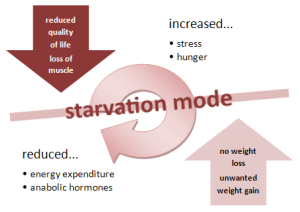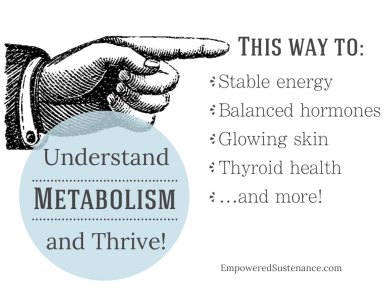I hope everyone’s New Year is off to a fantastic start! I’ve seen lots of new faces at my gym and hope that they can keep themselves motivated for some healthy lifestyle changes in 2014! Weight loss, fat loss, healthier eating, and getting in better shape are often at the top of many lists of resolutions. The problem though, is that there is overwhelming and conflicting information on how best to achieve these goals. Given my professional background and personal experiences, I often have many people reach out to me for tips, tricks, and recommendations…and I’m always happy to share what I know. One of my ongoing pleas to those who ask me (and even to those who don’t), is PLEASE DO NOT STARVE YOURSELF!! And by starve, I don’t just mean stop eating…I also mean UNDEReating. I’ve written before about how eating less food can cause your metabolism to slow down to conserve energy, and I recently found an article by integrative physician, Jade Teta where this process is explained both simply and thoroughly.
In the article, Dr. Teta discusses “starvation mode” (aka adaptive thermogenesis), which is the body’s natural protective mechanism developed through millions of years of evolution to keep you from starving when food was something you had to work to get. Rather than trying to paraphrase this awesomely well-written, concise article, I think I’ll just share it as is:
Starvation Mode? What are we really talking about
We realize there is a ton of noise out on the internet regarding “starvation mode”, “metabolic damage” and “weight loss resistance”. Because of that it is difficult to make sense of what people mean by these terms.
Whether you are a lean bodybuilder, an elite athlete or your average Jane or Joe trying to lose some weight, you will be impacted by the metabolic compensation of the body. It is a natural response of the metabolism and not some crazy disease state. Here is how it works in bullets so you can easily follow the narrative:
- You go on a diet. By diet I mean you do some combination of “eat less, exercise more”.
- At the start you do just fine and may actually lose a few pounds. You’re happy. YAY!
- A few days or weeks in and your body starts to compensate. You start feeling more hungry, your energy becomes unstable, you start getting cravings and your metabolic rate declines. This is metabolic compensation. It’s the body’s normal protective response. Lets called this starvation mode phase 1.
- Because of this metabolic compensation your weight loss slows, halts or, if you have a very large drop in metabolic rate and/or can’t control the hunger and craving urge, even reverses.
- Being a good little dieter you decide to double down on the eat less, exercise more approach. You think, “I just need to work harder”.
- Things may change briefly. Maybe you lose a few more pounds or at least stop the weight regain. But the body compensates again and this time more quickly.
- Perhaps you try even harder, but the body slowly becomes more resistant to your attempts.
- Now you are eating like a bird and spending hours in the gym and nothing seems to be happening. We call this metabolic resistance. You can think of this as starvation mode phase 2.
- You don’t understand what is happening, but you have an iron will. All you need to do is work harder. You hit the internet and immerse yourself in the best “thinspiration” you can fine. Maybe you play some Rocky theme music. You quadruple your effort!!
- You see some results, but now you have other worries. You start feeling gassy and bloated all the time. If you’re a women, your menses becomes irregular or disappears. Your libido is shot.
- Your sleep is disrupted and you are exhausted. You may feel a “wired but tired sensation”. You feel sick and unwell. Anxious or depressed but usually both.
- You just can’t keep up any more. Now you are slowly gaining weight no matter how hard you try. This is metabolic damage. Phase 3 and the final stage of starvation mode.
- You go to a physique coach. Tell them what is going on and they say “you are in starvation mode”. You need to eat more and ease up on the exercise. They tell you to move from an eat less, exercise more approach to an eat more, exercise less approach.
- Guess what happens? You gain so much weight so fast you could swear someone stuck an air pump in you! Not good, not good at all. You gain 15 pounds in 7 days and feel worse than ever.
- You go to seek answers, but no one has them. What do you do? You go back to the eat less, exercise more model. But it still does not work and continue the cycle doing more damage to your body and your psyche.
The escape from starvation mode
Here is the information you have never been told. Your body does not work like a calculator. It works like a thermostat.
What happens if your heater breaks in the winter and starts pushing out cold air? You don’t turn up the fan speed do you? You turn it off and find another way to keep warm.
When you play the game described above you are playing an UN-winnable tug-o-war game. You pull as hard as you can and the metabolism pulls back just as hard or harder. So you pull even harder and the metabolism once again responds in kind. If you keep playing this game you will end up in a heap of exhausted rubble on the ground. You can’t win this game, so stop playing. Remember that trick in tug-o-war when you were matched against a team that you knew would beat you? When they pulled, you let the rope go and they went flailing to the ground as you looked on in laughter! That is how you beat starvation mode.
Fixing starvation mode
Whether you are in metabolic compensation (phase 1), metabolic resistance (phase 2) or metabolic damage (phase 3) the beginning steps are the same.
You stop the eating less, exercise more approach and instead let go of the rope by matching your intake of food with your output of energy. You either 1) eat less and exercise less OR 2) eat more and exercise more.
These are your only two options, and the only way you start to decrease the stress on your metabolism while not gaining weight in the process. If you happen to have gotten all the way to stage 3, your only real option is the eat less, exercise less approach.
Steps to take
Metabolic Compensation (phase 1): This phase is pretty easy to deal with. Just simply move to an eat less, exercise less OR and eat more, exercise more approach. The approach you choose does not really matter. This will almost always solve the issue. Expect to be back on track within a week.
Metabolic Resistance (Phase 2): If you find yourself in this phase you will need to cycle the diet. Spend 2-3 weeks in the eat less, exercise less phase and then switch to an eat more, exercise more approach for a time. You will likely need to take some other steps involving rest and recovery activities like prioritizing very low intensity activity like walking and muscle regaining activity like weight training over intervals and traditional cardio. Expect to be back on track within 1-3 months.
Metabolic Damage (Phase 3): Here you have no choice. It’s eat less, exercise less. It is also relaxing and restorative activity and no intense exercise or cardio. Even the popular short intense metabolic conditioning workouts will be too much at this stage. You will likely also need to consult with a functional medicine doctor who can evaluate thyroid, adrenal and gonadal function. This is beyond the scope of a physique coach to deal with. Supplements and or hormones may be required at this point. Expect to be back on track within 3 to 15 months (if you get the right help).
I hope this hit home with some of you who are struggling with weight loss and educates you as to what NOT to do. I often wish I would have had this information when I was 14, before I began the slippery slope of crash dieting that would find me in a decade longs struggle with eating disorders. Then again, now that I’ve made it through to the other side and now know how to properly nourish my body, I’m grateful for my experience, as it allows me to connect with and educate others.
If anyone has any struggles, questions, or success stories about anything mentioned in this post, please feel free to share 🙂
Ciao for now,
-E



Another eloquently said and extremely intelligent post. Bravo 🙂
Thank you, Erik! I really appreciate the feedback!
Pingback: What Women Need to Know To Lose Fat, Build Muscle, and Improve Performance (this one’s for you, ladies!) | Healthy Happy Fashionista
Great items from you, man. I have take into accout your stuff previous to and you’re just extremely fantastic.
I actually like what you have acquired right here,
certainly like what you’re stating and the best way by which
you are saying it. You are making it entertaining and you still take care of to
stay it smart. I can not wait to read much more from you.
This is actually a great web site.
Thank you very much for the positive feedback, Paulina! I’m very happy to hear that my writing is both informational and entertaining.
Good day! Would you mind if I share your blog with my facebook group?
There’s a lot of folks that I think would really appreciate your content.
Please let me know. Many thanks
Absolutely, Grace. If you feel that others you know could benefit from the content of my blog, I’d love for you to share it. Thank you!
Hi there i am kavin, its my first occasion to commenting anywhere, when i read this article i thought i could also make comment due to
this sensible article.
Hi Kavin. Thank you for stopping by and leaving a comment! I really loved writing and sharing this info because, especially as a woman, I see so many people under eating as a means to lose weight/fat…when really, they could probably eat MORE and fuel their metabolism. I’m so glad you enjoyed my content, and I hope to bring you more useful info in the future!
Hmm is anyone else encountering problems with the pictures on this blog loading?
I’m trying to determine if its a problem on my end or if
it’s the blog. Any suggestions would be greatly appreciated.
Hi Adelaide. Thank you for mentioning that you were having issues with viewing the photos on my blog. I am able to view them when I look at my blog in Firefox browser. Can you tell me which browser you’re using, and also if you are using a mobile device or tablet? I’ll do my best to troubleshoot. And thanks for stopping by and reading!
My relatives all the time say that I am killing my time here at web, except I know I am
getting familiarity every day by reading such good articles.
Hi to all, how is everything, I think every one is getting more from this web
site, and your views are good in support of new visitors.
I am regular reader, how are you everybody? This paragraph posted at this web site is
in fact good.